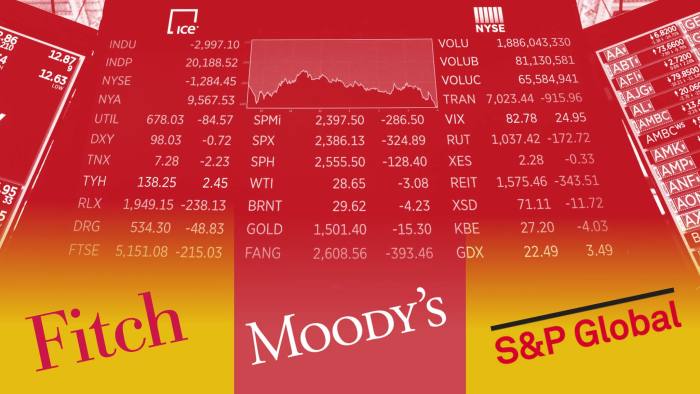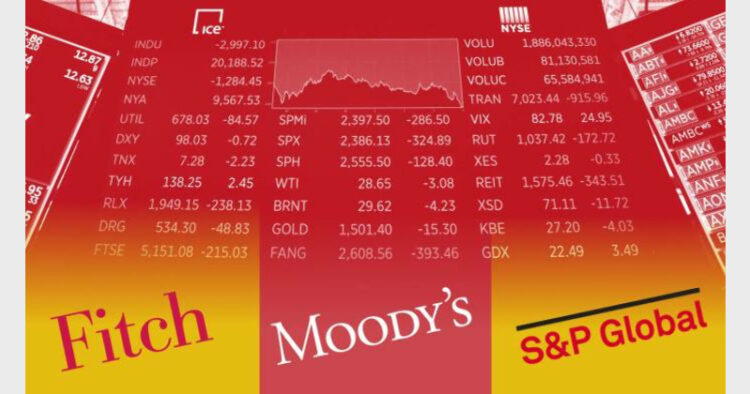
A few days ago an international agency, Moody’s downgraded the outlook of Indian banks from stable to negative. Moody’s says that the quality of the assets of Indian banks is deteriorating due to the loss caused by the coronavirus. Moody’s says that this blight is expected to happen in all sectors including corporate, medium and small industries and also retail. This will affect both the capital and liquidity of the banks. Moody’s has also stated that though funding and liquidity in state-owned banks may remain stable, however, due to the recent mess of a private sector bank (Yes Bank), due to risk-avoiding tendency in the system, small lenders may face the crisis of liquidity. After this announcement by Moody’s, there was a sharp decline in shares of Indian banks. This is not the first time that Moody’s or any other rating agency has dropped rating of banks or other companies. These rating agencies often do this and sometimes it happens without a reason for such action. In view of the recent rating downgrade of Indian Banking, by Moody’s, it has to be noted that the advice given by Securities Exchange Board of India (SEBI) the regulator of India’s stock market, has also been ignored by Moody’s. SEBI had said that a three-month moratorium in principal and interest payments should not be considered as default in loan repayment, it is only a short-term arrangement.
It has to be understood that the downgrading of the rating of Indian banks by Moody’s has not only led to upheaval in the stock market, but it may also create many more hurdles for banks recovering from the ongoing NPA problem. It remains to be seen how the Moody’s rating downgrade of the four financial institutions ICICI Bank, Indus Bank, IDBI Bank and Axis Bank will impact the financial system.
Three major rating agencies named Standard and Poors‘, Moody’s and Fitch have a significant presence in the world. Standard and Poors’ and Moody’s have headquarters in the US, whereas Fitch is headquartered in both New York and London cities. Today, when the first two companies together make 81 per cent rating business and the remaining 13.5 per cent share is with Fitch. These rating agencies (companies) rate countries and financial institutions around the world; and based on their ratings, the interest rates on the debts taken by the governments of these countries is determined. People’s trust in various financial institutions also depends on the ratings done by these agencies. While these agencies rate the credibility of institutions and countries around the world, and their ratings are recognised as legal or have recognition; these agencies themselves are not beyond suspicion.
Shortly before the debacle of big banks and financial institutions in America in 2008, these rating agencies were giving the highest ratings to these institutions and world had absolutely no idea about their poor financial health. In such a situation, the credibility of these rating agencies began to be questioned. There have been several instances of their criminal errors in India as well. Not only this; the role of audit firms was no less suspicious. For instance, on the one hand, a multinational audit firm was hiding the frauds of the software company named ‘Satyam’ in India, the company was also highly rated by these rating agencies. This caused a huge loss to the country and the shareholders of Satyam Company.
Although rating agencies have lowered their ratings for financial institutions around the world due to the economic impact caused by Corona, also known as the ‘Chinese virus’, critics believe that these agencies already had overrated their client companies. This is because these rating agencies generally do not make suo-moto rating; rather companies pay these rating agencies to do ratings. Therefore, these rating agencies do not drop their ratings even after the deterioration of the financial condition of their client companies, due to fear of losing their customers.
The Financial Times newspaper writes that in 2015, the Standard and Poor’s rating agency conceded an allegation that they had been rating their clients high in order to win business. In such a situation, the agency paid a compensation of US $ 1.4 billion to the US government and the US states. In 2017, Moody’s paid damages of 366 million dollars for a similar charge. These incidents expose the reality or creditworthiness of these credit rating agencies.
Experts believe that despite the financial crisis of 2008 and the collusion of rating agencies with the beneficiaries of their ratings, leading to the world crisis, there has been no improvement in the functioning of rating agencies. In fact, the fault is not primarily of these rating agencies, fault lies with the system, in which companies are allowed to pay directly or indirectly to the rating agencies and due to which they get high ratings. This issue is of ‘conflict of interest’.
It is believed that the reality is also that investors make their investment decisions based on the ratings of rating agencies. But now the situation is fast changing and investors have started investigating other parameters as well. On the basis of which they are taking decisions, which are different from the assessment of rating agencies. But the rating agencies still have a monopoly.
What is needed today is to curb the monopolistic powers of these rating agencies, so that the credibility of companies can be accurately assessed, preventing a conflict of interest. Today, investors around the world are losing out due to false credit ratings by these rating agencies, the penalty on these companies is much less than that.
It is true that in many cases it is not possible for the rating agencies to have complete information. But hiding information received cannot be justified in any way. Today, the problem of conflict of interest arises because the companies pay fees to the rating agencies, due to which they are not able to properly rate the creditworthiness due to fear of losing business.
Secondly, these rating agencies enjoy monopoly all over the world and these rating agencies are mostly US-based. For this reason, it has also been seen that as a country, US and its companies get better ratings from these agencies.
Not only this, since the entire rating business is in the hands of only three companies, the possibilities of misuse of monopoly powers increase. Therefore it is important that these rating companies also face competition and their efficiency should improve with competition
It is important that more and more rating agencies get recognition. There is no dearth of talent in various countries. Why India cannot have its own rating agencies. In the same way, different countries can have their own rating agencies. In such a situation the monopoly of Moody’s and Standard & Poor’s etc. will end, when these agencies are recognised globally.
At the same time, these rating agencies should have a system of earning money from investors themselves, ending the practice of hiring of rating agencies by the concerned companies which are rated, and paying fees to curb conflict interests. Companies should be disallowed to pay fees to these rating agencies.
(Associate Professor, Department of Economics, P.G.D.A.V. College, University of Delhi)














Comments